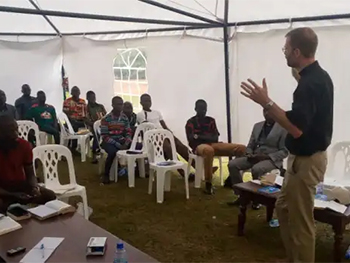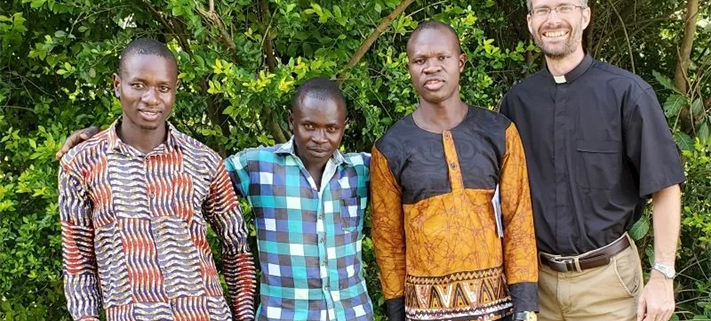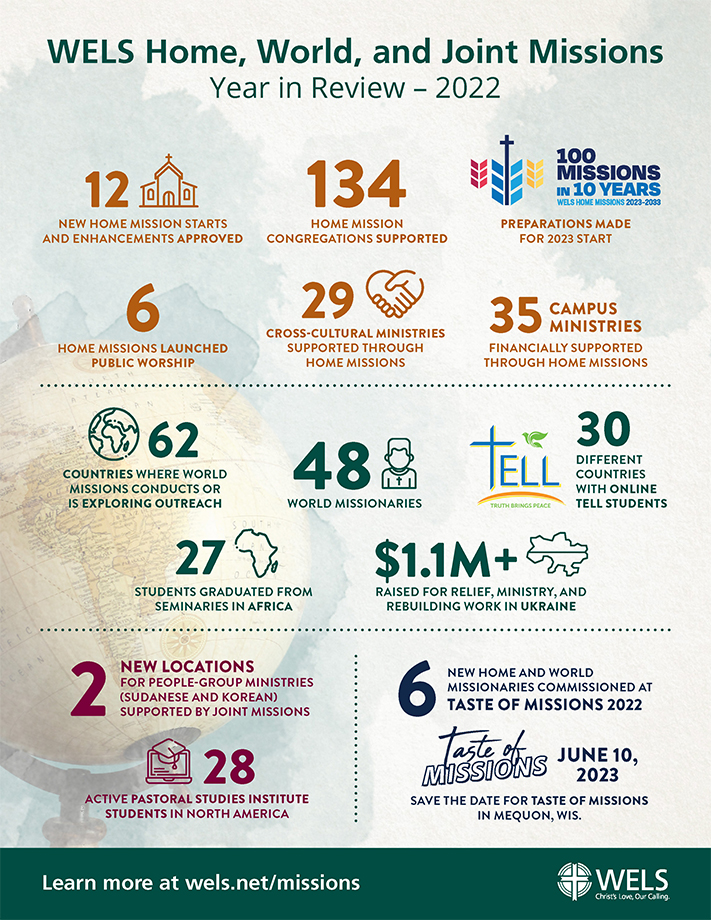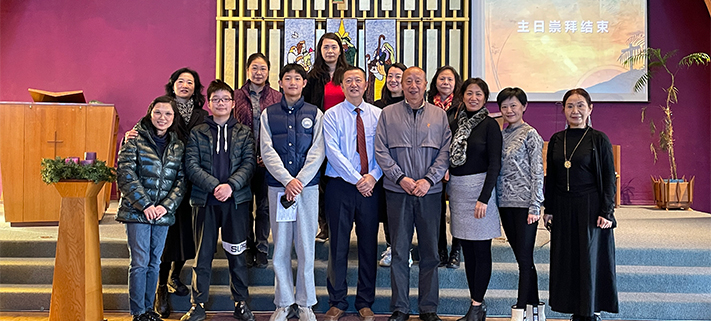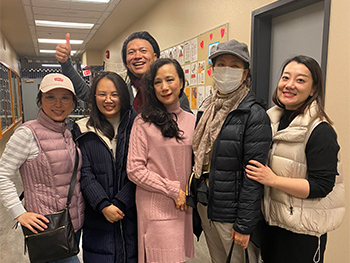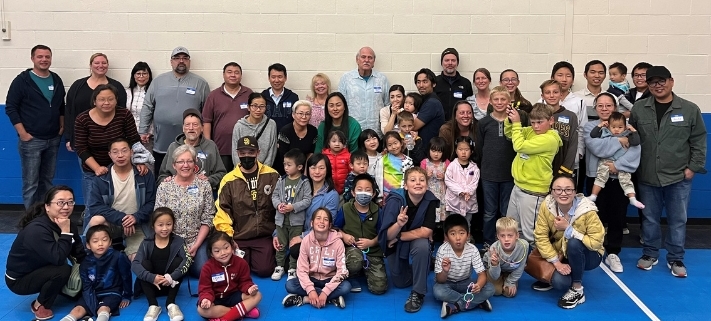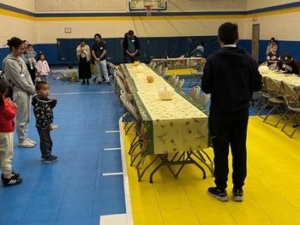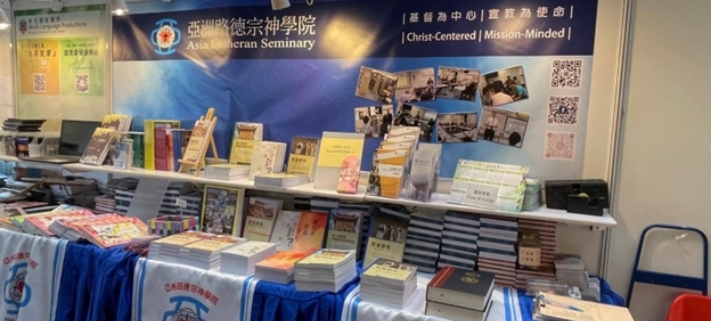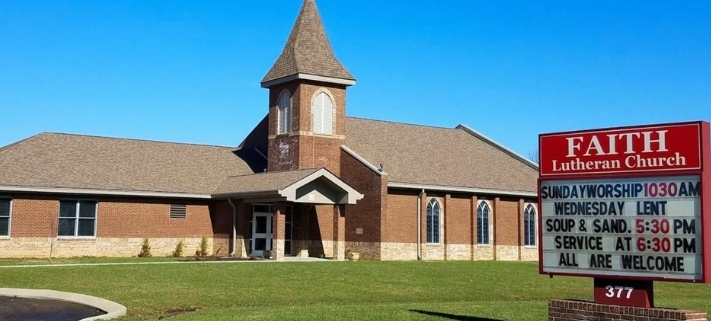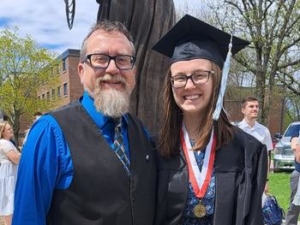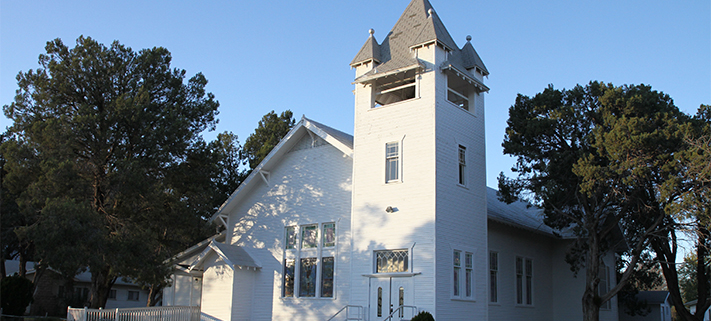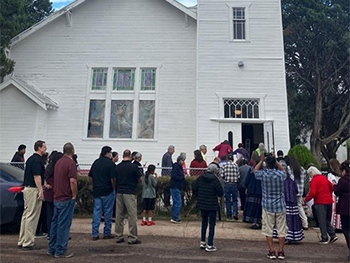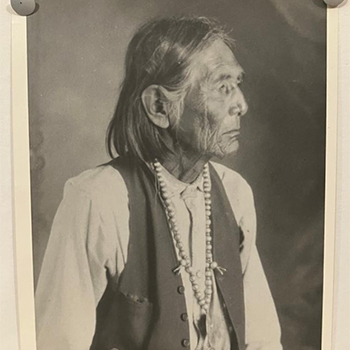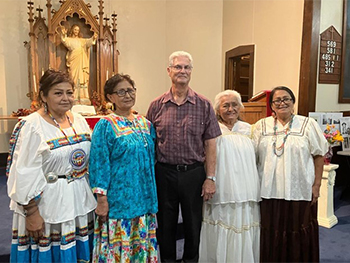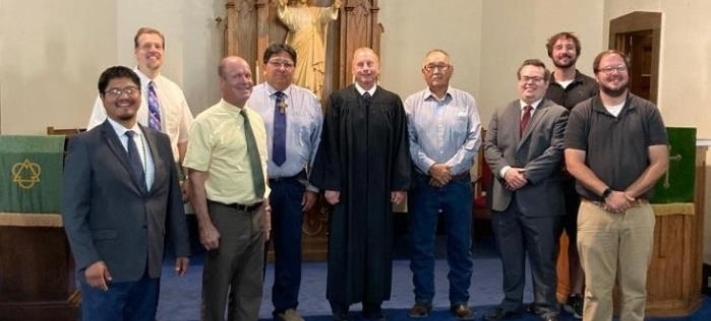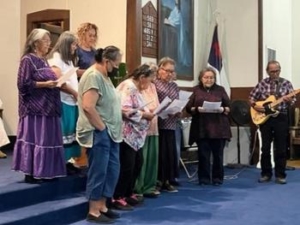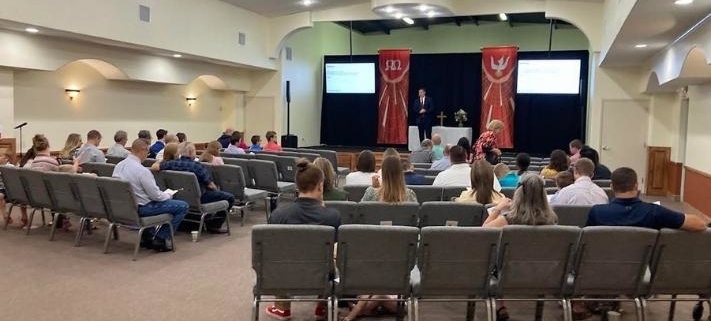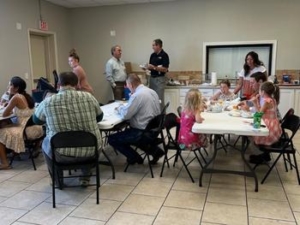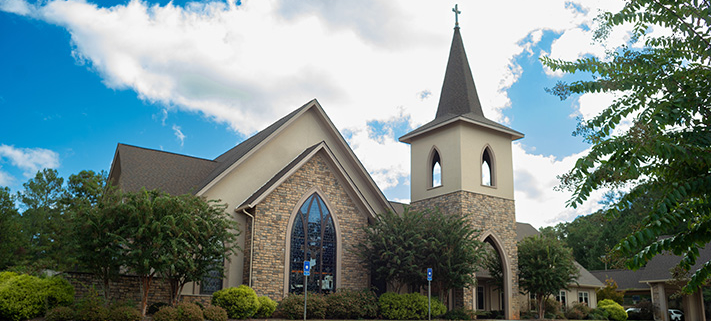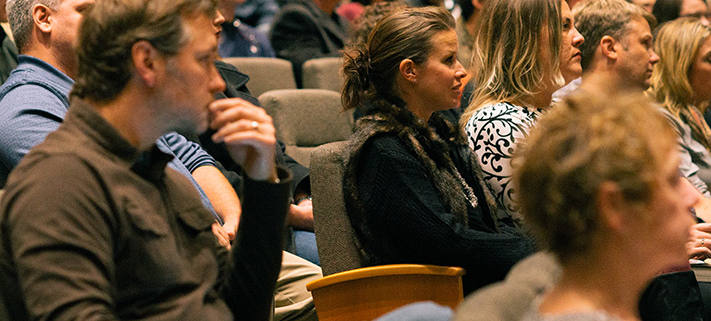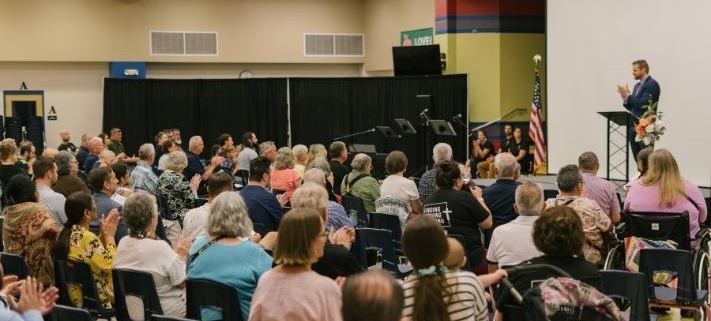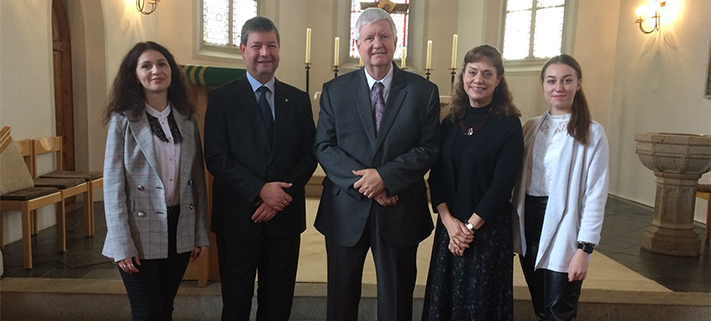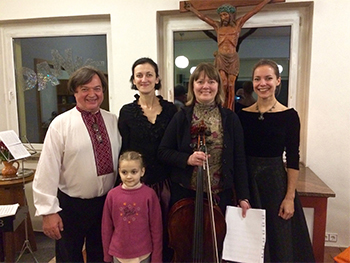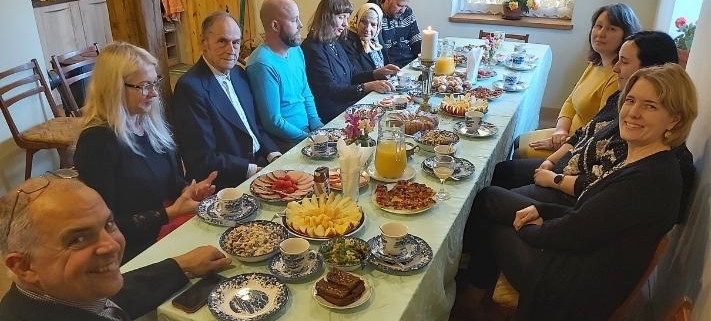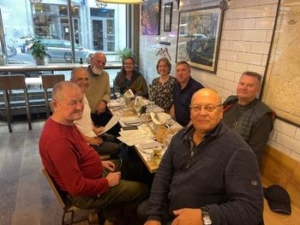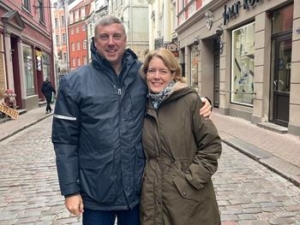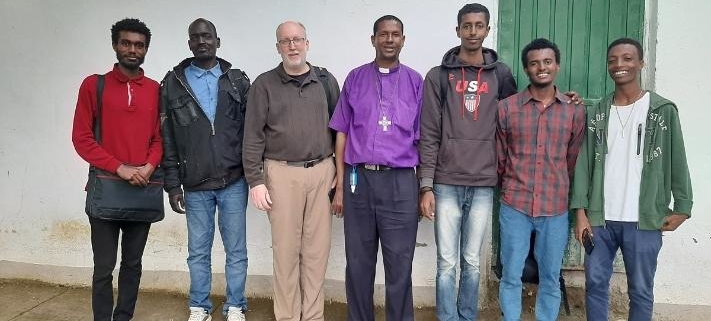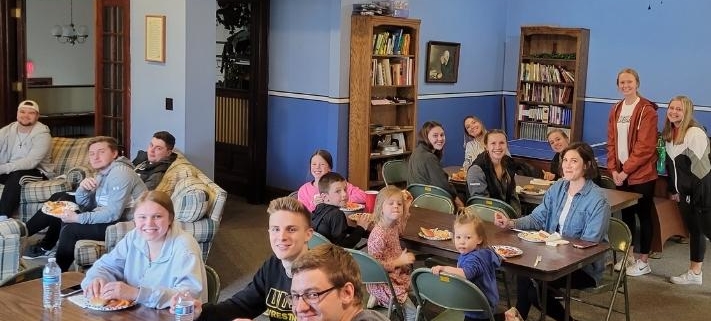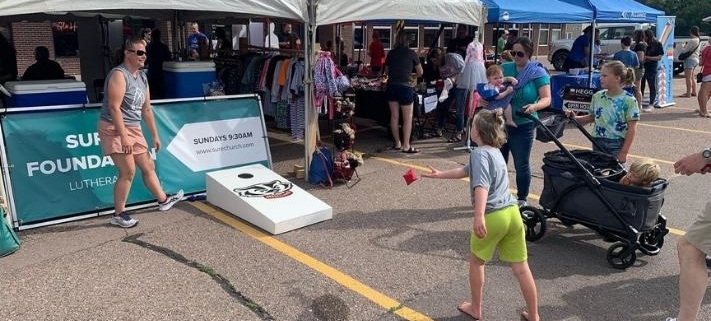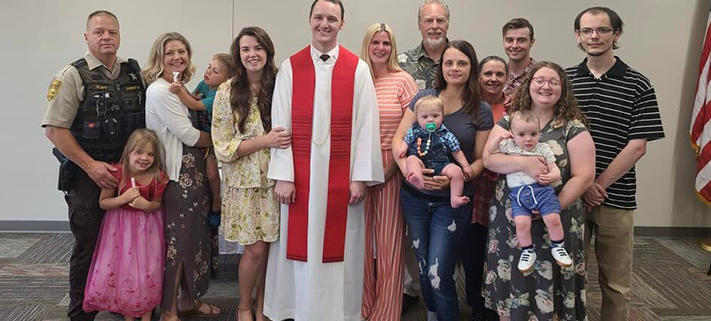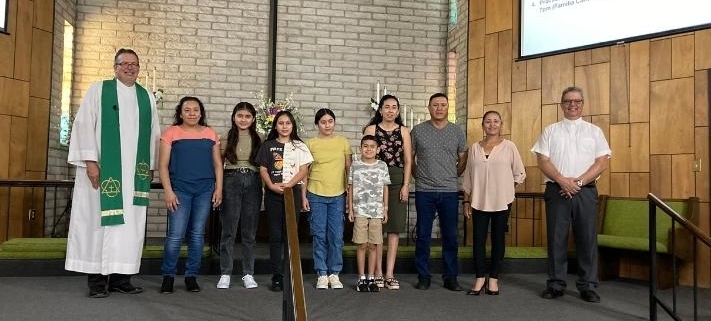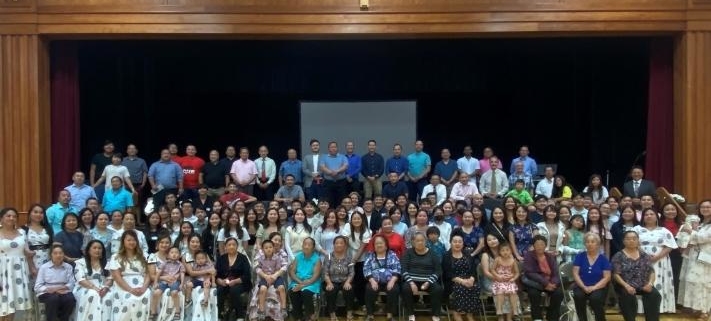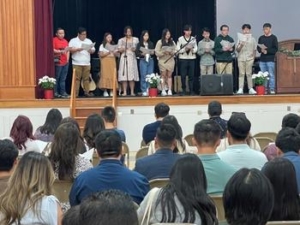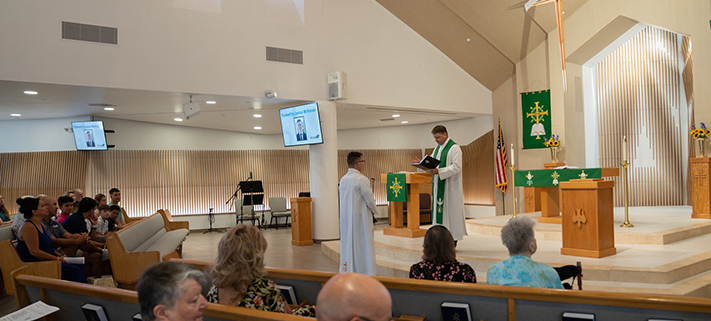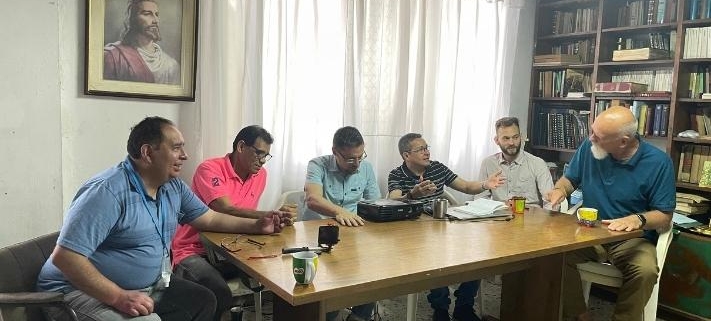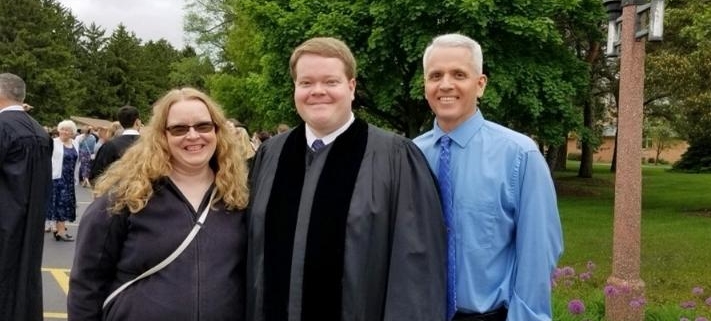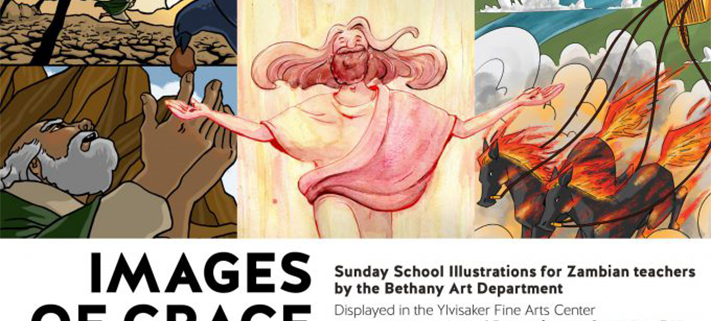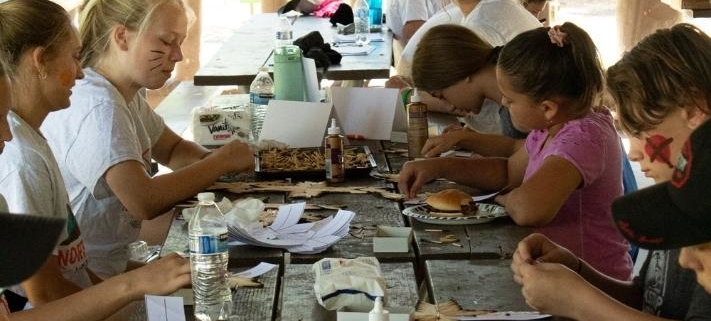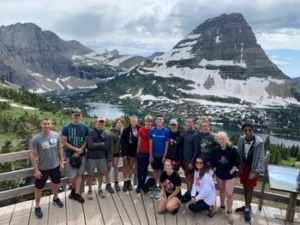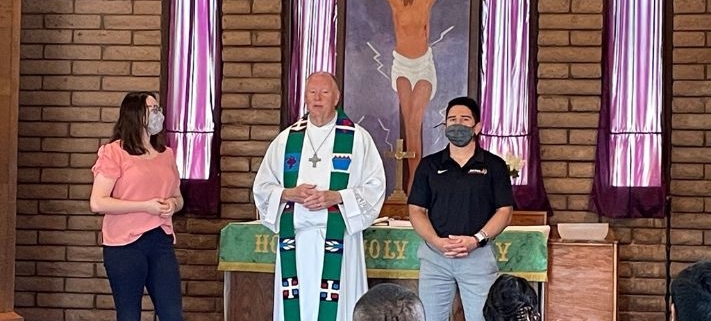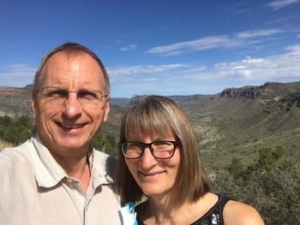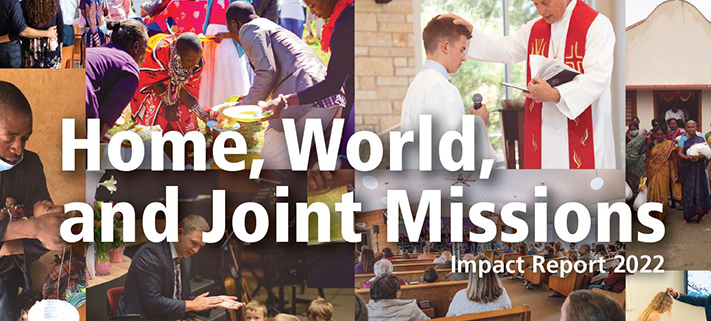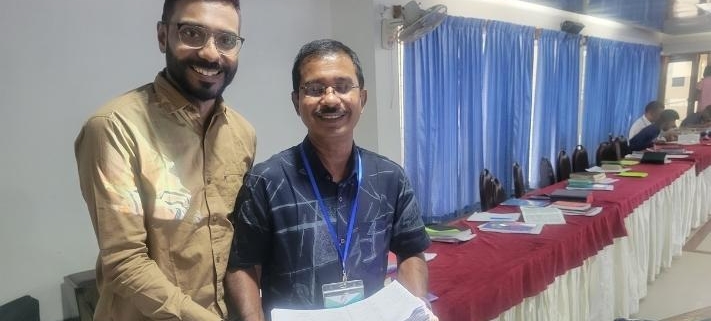God had Isaiah say it first, but Peter quoted him. “All people are like grass, and all their glory is like the flowers of the field; the grass withers and the flowers fall, but the word of the Lord stands forever” (1 Peter 1:24-25).
Many people have favorite verses or stories in the Bible. This passage has always spoken to me. It has it all: original sin, man’s mortality juxtaposed against God’s eternity, means of grace, and preservation in faith. When you add that Isaiah originally put those words into the mouth of John the Baptist to prepare the way for Christ, you also have the summary of our Law and Gospel witness.
Perhaps that verse suggests the nexus of outreach and worship, too. The lifelong Lutheran with a “WELS” tattoo needs to hear “all people are like grass” just as urgently as the “none” granddaughter. The serious-looking octogenarian in the second row needs to hear “the word of the Lord stands forever” so that his heavenly hope rests on God’s eternal word. So does the postmodern millennial who is looking for an anchor in the storm of 21st century culture.
All the souls in your parish and community will wither and fall. Will they do so with the Lord’s eternal promises in Christ? You already know that the application of our gospel witness looks a little different from place to place depending on context in ministry. This is a part of what it looks like in Marana, Arizona.
Context
Redeemer is located in the northwestern suburbs of Tucson, Arizona. Tucson stretches across a valley floor to the foothills of five mountain ranges. It is located roughly halfway in between Phoenix to the north and Mexico to the south. In 1950, Tucson’s population was about 80,000. Today, it has surpassed 1,000,000. The University of Arizona is here. And, because the sun shines here more than it does in Florida, so are a lot of retirees looking to escape the cold and snow. That makes the city an eclectic mix of young and old, as well as a melting pot of people from every corner of the country.
Parish demographics reflect our community. We are close to equal parts ages 0-25, 25-55, and 55 and up, and reflect many different races and ethnicities. We have native Tucsonans, transplants from the west coast, the Midwest, and the east coast. Of our more than 500 parishioners, maybe 40 percent have a WELS background. Among our numbers are many new Christians, recent converts, de-churched who have found a new home, and others who have come to us looking for orthodoxy.
An important part of our context is Marana’s rapid population growth. When Redeemer relocated to our current location in 1998, we didn’t have a lot of neighbors. Now, thousands of homes have been built, and thousands more are planned. On any given Sunday, we will welcome six to eight brand-new first-time guests to worship. In a year we’ll total between 400-500 first-time walk-in guests. Many of them are new to Arizona, new to our area, and are looking for a church home.
Culture
Some congregations are not ready for outreach. That culture needs to be built. My former congregation in Indiana wasn’t ready. Their congregational roots dated back to 1972 when a splinter group left LCMS because of frustrations over Seminex. Feeling burned by their former church body shaped the congregational culture. Their attitude was, “It’s us against the world!” Anytime a guest visited worship, you could feel the coldness and see the suspicious looks from across the chapel. They needed patient teaching that helped them make peace with their past before they were ready to make peace with worship guests.
A similar situation existed when I arrived in Tucson. Redeemer enjoyed rapid growth in the early 2000s, expanding their pastoral staff to four full time men and daughtering a mission congregation. That came to an abrupt halt when the market corrected and the economy stalled in 2008. The so-called “Great Recession” hit Tucson hard. Housing starts stalled. Many who were upside-down on their mortgages were forced to sell at a loss and move to a new city for employment. The parish that had seen impressive growth was halved. By the end of 2011 all four pastors had taken calls away, leaving a once thriving congregation looking forlorn. Some were downright angry. And when you walked into church, you felt it. They needed time to heal. They weren’t ready for outreach.
“It’ll take five years before the congregation trusts me. We need time to heal.”
How do you change that? How do you change a congregation’s culture and prepare them for outreach? You make haste slowly. Just after I got to Tucson, I remember talking to a very faithful man. He was a retired businessman, and bored. He was so excited to have a pastor after an extended vacancy that he walked into my office and wrote me a blank check. “Anything you want, pastor, I will do it.” His noble enthusiasm was tempered by my curt response. “Jim, I accept your offer, but it’ll take five years before the congregation trusts me. We need time to heal.” He looked at me in disbelief! He was ready to go. Why didn’t the congregation share his enthusiasm?
The first thing we worked on was attendance. In Indiana, you always knew who was there; the numbers were smaller. Redeemer was at least five times larger than that parish. I was new and didn’t know anybody. Add to that Redeemer had no system of tracking attendance or differentiating members from guests. After about a year, I called Jim into my office. “I’m still getting to know the people, but it sure looks like we have a lot of outreach potential.” Outreach? He didn’t think so. Neither did many of the other leaders in the congregation. In the absence of accurate data, who really knew?
One of the tools we agreed to use early on was a Friendship Register. Leaders were dubious whether it would be embraced or be perceived as an intrusion. To avoid the latter impression, we came up with an idea. Rather than ask a serious looking usher in a blue blazer to hand them out, we assigned the task to four smiling children in elementary school. Even now we rarely get 100% to participate, but when a pigtailed little girl in a sundress hands you the register, even the most curmudgeonly will usually cooperate. It took time and patience, but eventually it caught on. After we collected attendance data for a season, we discovered that on any given Sunday 25% of the worshipers were non-member guests, either first time worshipers or repeat attenders. Leaders were stunned! We had a mission field right inside our chapel and no one had any idea!
When a pigtailed little girl in a sundress hands you the register, even the most curmudgeonly will usually cooperate.
As leaders began to acknowledge the open door of outreach God was driving into our chapel, we began work on our worship welcome. That meant addressing our Sunday morning culture. As you address culture, this point is critical: the pastor sets the temperature for the congregation climate. Many people already operate with a stereotypical view of pastors that we have to work to overcome; they are stuffed shirts; they’re overly serious, not down to earth or relatable. Many people never see their pastors other than in the pulpit, even on Sunday mornings. Do your congregation a favor and work hard to dispel those stereotypes! Set the temperature. Be visible on Sunday from the time people arrive. Meet them in the parking lot; welcome them in the entryway; visit with them in the nave. Call everyone by name, look them in the eye, and greet them warmly. Carry their burdens. All people are like grass, pastors included. Show them you’re human. Smile, joke, and laugh. When you practice the golden rule, treating people like you genuinely love them, they’re much more inclined to listen to the voice of the Good Shepherd.
An evangelism professor from our Seminary once noted that guests make up their minds about whether they’ll return to your church in the first two minutes of their visit. Before they hear your carefully rehearsed choir, before they see your professionally produced service folder, before they listen to your homiletical prowess, they’ve already made up their minds. Creating a friendly and welcoming atmosphere is worth the effort. After the pastor leads by example, put your people to work. We placed greeters outside the chapel doors to welcome people with a smile and a hearty “Good morning!” Ushers were carefully trained to answer questions and assist with special needs. We tapped five of our most bubbly parishioners for a special task. Get to church a half hour early, and personally welcome every new face you see in the chapel, whether young or old. Over time, something better happened. The whole congregation began to participate. Now, it’s common for first time guests to comment before they leave, “This is the friendliest congregation I’ve ever visited.”
We tapped five of our most bubbly parishioners for a special task.
Chapel
Our chapel was dedicated in 2002. When I arrived ten years later, our property team noticed the carpet bubbling. “We should fix that.” A year later, transplants lamented that the acoustics were lousy. “Can’t we fix that?” Another year passed, and I followed up on guests who hadn’t returned. They explained they couldn’t see the chancel because of the placement of a load bearing pillar. “Can’t you fix that?” In 2015, a parent who attended school chapel bemoaned how washed out our screen projectors were. “Can’t you fix that?”
Although our chapel was very usable, there were enough needling limitations that congregational leaders resolved to address it. They planned a tasteful cosmetic update that would be done by fall 2019 in time for our 75th anniversary. We selected a designer, made plans, but missed a key vote and our anniversary deadline. The following spring, COVID complicated everything. That turned out to be a gift. Since our timelines were pushed back, we revisited our plans, adjusting its scope to prioritize the chancel. After we suffered through supply chain constraints and constantly pushed off deadlines, our project is now complete.
A stunning makeover that powerfully influences both worship and outreach.
Our color scheme changed from the greens and purples of a Tucson sunset to something warmer. We replaced the carpeting with luxury vinyl tile. The pews were reupholstered. We purchased new LED light fixtures, and the entire chapel was painted white. The music space was reimagined. The biggest improvement, though, was in the chancel. The screens were removed, so now the eye is centered on the powerful visual of a free-floating cross.
What began as an innocuous project to address a punch-list of irritations turned out to be a stunning makeover that powerfully influences both worship and outreach. Our previous chapel was utilitarian, but “meh.” The remodel has a wow factor. It is difficult to describe just how impactful good lighting is on people’s demeanor, their mood, and their willingness to engage in worship. A bright space makes for happy people who want to engage. Replacing the carpet with tile has significantly enhanced our singing. It’s a live room; sound jumps. A retired LCMS pastor who worships with us occasionally commented, “I always knew your people could sing. But now they raise the roof! The new acoustics are a real game changer.” Prior to the remodel, nobody commented about our chapel. Now it’s often one of the first things people notice: “Your chapel is just beautiful.” Happy people, vigorous singing, and a friendly culture connect worship to outreach.
Happy people, vigorous singing, and a friendly culture connect worship to outreach.
Consistency
One of our oft repeated internal sayings is, “Whoever shows the love gets the soul.” You have probably already done the math. With as many walk-in guests as we see annually, shouldn’t we have 4,000 members by now? That’s our next mountain to climb. We’re working on building a consistent, repeatable follow-up program to worship. Here is what we’ve built so far.
Whoever shows the love gets the soul.
Every Monday, a lay-led team visits those first-time guests at their home. They deliver a welcome bag filled with devotion books, coffee cups, magnets, and church information. What’s in the bag is irrelevant. The initiative and the personal, face to face visit is what matters. Since they did us the honor of visiting our chapel in person, the least we can do is say “Thank-you” in person. By the end of the week, a team of ladies with good penmanship has sent off a handwritten note. About ten days after their initial visit, the chairman of the outreach team reaches out by phone or email. The hottest prospects are referred to the pastor. The simple logic behind the effort is that you never know which personal touch will resonate. Whoever shows the love gets the soul.
About a year ago, Joe walked into church. He’s an 80-year-old Marine. His idea of fun is to wake up at 2 a.m. and bicycle 40 miles up Mt Lemmon. After that he lifts weights and rides his motorcycle. When Joe walked into church the first time, he told us he hadn’t been in church in 50 years. But his wife had just died; he was looking for answers. “All people are like grass.” I didn’t meet Joe that day, but our follow up teams ran their program: doorstep, handwritten note, outreach chairman, pastor. A vicar eventually took him through instruction and today he’s an active member. Just yesterday, this 80-year-old Marine approached the woman who delivered the initial follow up bag. He was weeping. “I am so thankful that Redeemer reached out to me. You have no idea how special this church is to me.” Whoever shows the love gets the soul.
This 80-year-old Marine was weeping.
I love that story because I had nothing to do with it. Joe is a victory of our parish, a victory of the consistency of our process, of the Golden Rule. You know that there are no silver bullets in ministry, but this is as close as it gets. Work hard. Take initiative. Be consistent. Follow up and follow through. Show love. Delegate, and train your people for ministry. And then get out of the Holy Spirit’s way.
Conclusion
Nobody has ever been converted because of a shiny new chapel. Nobody repents because of a solid greeter or usher program. No saint who is now in heaven credits the bubbly brunette or the glad-handing pastor. It’s the Word that works.
Consider the alternative. A gloomy environment, dour people, or an aloof pastor are a turn off. Any one of them can undermine a gospel witness, casting a pall over the God we praise. Of course, God can save people in spite of us. Is that really what we’re aiming for?
Understanding your context in ministry matters. You’ve got to play the cards God dealt you in your backyard. Working to improve your ministry culture helps to prepare souls to meet Jesus. That’s what John did. He prepared the way for the Lord by eliminating barriers. He made the path straight. He raised the valley up, he brought the hills down, he smoothed out the rough ground. He made it easy for people to meet Jesus.
Isaiah said it first. “All people are like grass, and all their glory is like the flowers of the field; the grass withers and the flowers fall, but the word of the Lord stands forever.”
“And this is the word that was preached to you” (1 Peter 1:25).
By Adam Mueller
Since 2012 Pastor Mueller has served Redeemer, Tucson, AZ. Previously he served in Kokomo, IN where he also helped start missions in Lafayette and Greenwood, IN. Besides parish ministry, he has served in various roles on the district level including evangelism coordinator and circuit pastor. On the synodical level, he has served on translation review teams, the Commission on Congregational Counseling, and as chair of the Hymnal Introduction Program.
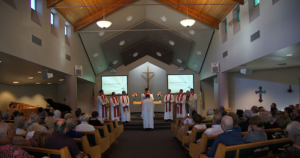
“The remodel has a wow factor.” The photo to the right shows before the remodel. The after picture is at the beginning of the article. Additional photos are available online in #116a at worship.welsrc.net/download-worship/worship-the-lord-worship-and-outreach. Pastor Mueller also led a significant renovation project in Kokomo, IN. It was featured in #19 at worship.welsrc.net/download-worship/wtl-church-architecture.
Recent Resources
The Foundation Year A worship planner – PDF and Excel files for the full year were posted in mid-August after Advent through Epiphany was posted earlier in June.
Hymnal Highlights – The June 17 post includes ideas for fall or long-range planning. You can subscribe to receive them, along with other information, at welscongregationalservices.net/subscriptions.
Christian Worship: Service Builder – Six tightly scripted videos are now available at: christianworship.com/resources (under Articles) and at welscongregationalservices.net/hymnal-introduction-resources. These videos are useful both for those already using Service Builder and for those just exploring—and to help congregational leaders to see the value and potential of Service Builder.
Learn about how WELS is assisting congregations by encouraging worship that glorifies God and proclaims Christ’s love.
WELS Commission on Worship provides resources for individuals and families nationwide. Consider supporting these ministries with your prayers and gifts.
[fbcomments num=”5″]
